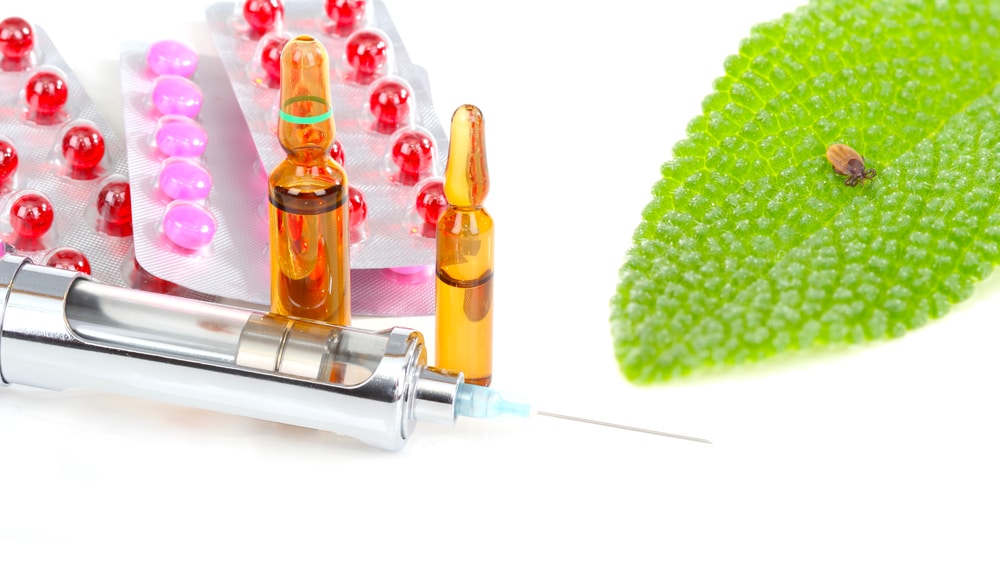TICK-BORNE ENCEPHALITIS

WHAT IS TICK-BORNE ENCEPHALITIS ?
Tick-borne encephalitis is a disease caused by a flavivirus, which is transmitted through tick bites. It is also possible to get infected through the consumption of unpasteurized dairy products coming from infected goats, sheep or cows.
Tick-borne encephalitis is characterized by a fever, body aches, loss of appetite, headaches, nausea and vomiting. If the virus reaches the central nervous system, swelling of the brain and of the spinal cord may occur, as well as confusion and sensory disturbance (this happens in 20 to 30% of the cases). In rare cases, the disease can be fatal.
WHAT IS THE RISK FOR TRAVELERS ?
Tick-borne encephalitis occurs in many regions of Europe and Asia. The most affected areas are Eastern France, Northern Japan and Northern Russia, where several thousands of cases are reported each year (especially in Russia). But the infection is also highly present in Czech Republic, Estonia, Hungary, Latvia, Lithuania, Poland, Slovenia, Sweden, Switzerland, China, Mongolia and South Korea. All the travelers going to these countries at risk may be infected with tick-borne encephalitis. The risk is relatively low among the travelers staying in urban areas. But the persons traveling in the countryside and practicing outdoors activities are exposed to an extremely increased risk, as well as the people consuming unpasteurized milk and cheese. It is important to note that the disease is more prevalent during the warm season, between April and November.
HOW TO PREVENT TICK-BORNE ENCEPHALITIS ?
A vaccine against tick-borne encephalitis is available in some countries, but not in the United States. If you are going to a country at risk and there is no vaccine available in your country, note that you can get vaccinated in Europe or in Canada.
While traveling, you must protect yourself efficiently against tick bites and you should be careful when consuming dairy products.
- Wear protective clothes, such as long pants, long-sleeved shirts and hats, especially if you are practicing outdoor activities (such as camping) in forested areas or on farmlands. For better protection against ticks, you should tuck your shirt into your pants and your pants into your socks. Avoid sandals and preferably wear socks and high shoes (like boots).
- Apply insect repellent on exposed skin. Use a repellent offering long lasting protection and containing at least 20% of DEET. Always use insect repellents with caution and follow product instructions. Avoid applying repellent in your mouth, in your eyes and on your hands. You can combine sunscreen and insect repellent, just apply sunscreen first.
- For optimal protection against tick bites, use Permethrin-treated clothing and gear. You can purchase pre-treated clothes in specialized shops, or you can treat your own items, such as pants, socks, boots and tents. Always handle Permethrin with caution and avoid direct contact with your skin. Permethrin remains effective, even after several washes.
- Avoid going to wooded areas and to areas which are covered with high grass and brush.
- Always walk in the middle of hiking trails.
- Never consume unpasteurized dairy products, such as milk and cheese.
WHAT ARE THE PRECAUTIONS TO TAKE AFTER PRACTICING OUTDOOR ACTIVITIES ?
Hygiene
When coming back indoors, take a bath or a shower as soon as possible. Check you entire body for ticks. Use a mirror and look especially under your arms, around and inside your ears, in your belly button, behind your knees, between your legs, around your waist and in your hair.
Children
If you are traveling with children, regularly check them for ticks.
Clothing
Don’t forget to check your clothes and your outdoor equipment, as well as your pets.
Tick
If you find a tick, remove it properly with a tick removal device or with fine-tipped tweezers. Be careful not to break the mouth part, as this may result in the release of toxins in your body.
IF YOU FEEL SICK :
If you feel sick after traveling in a country at risk for tick-borne encephalitis and you think that you may be infected, you should see a doctor as soon as possible. Inform him/her of the places you have visited, of your activities there and of eventual tick bites.
We make every effort to ensure that the information posted on our website is up to date and accurate according to the latest public health recommendations; however, it is impossible for us to make changes on a daily basis.
For the most current travel health recommendations, please call our clinic as make an appointment with one of our travel health professionals.
